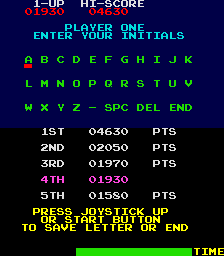You have a given browser game and your job is to add the possibility to store a highscore list for it. You have to slightly extend the game (not the core part of this exercise), write a backend for storing and querying highscores (including automated tests), and package everything up in Docker containers.
Writing the backend is part of your POSE class. The Docker part counts for your NVS MC grade.
Teamwork is allowed. Teams must consist of up to three people.
Note that you can earn up to six extra points for your POSE and NVS MC classes. Because of the exceptional situation, I will suspend the limit of 10 extra points per year. All gathered extra points will count for your final grade.
The browser game is a simple Space Shooter. You can find a description for how to build it on GitHub. You do not need to follow the exercise step by step. You can immediately switch to the ready-made game that you can find in the 08-game-over Git branch.
Don't forget to run npm install to get all the necessary dependencies. Run npm start to start the game. Run npm run build-dev to build a test release (including sourcemaps for debugging). Run npm run build to build a release version.
The game is not ready for adding a highscore list. You have to extend it in the following ways:
- Extend the game so that it counts points. For each shooted meteor the player should get one point.
- Add a possibility to enter player initials (three letters). You are free to design this feature as you want. Possible options would be e.g.:
Use .NET Core to implement a backend web API that can store highscores for the game. Here are the functional requirements:
- Store points associated with the initials of the player.
- Store up to ten entries in the highscore list. There can be less than ten highscores, but there must not be more than ten. If an 11th is added, the lowest highscore entry is deleted.
- Write at least five meaningful automated tests for your API.
- Extend the browser game so that it uses the web API to store highscores.
- Display the current highscore list (sorted descending) after the game ended. You are free to design this feature as you want (e.g. HTML table, display list in the game, etc.).
If you implemented all of the above requirements, notify me via GitHub issue. You will get one additional point for your grade (POSE).
- Write a Dockerfile for the extended game so that a user can start a webserver with the game installed and ready to play.
- Write a Dockerfile for the .NET Core backend.
- Write a readme.md file describing how to work the the Docker-related assets (e.g. building images, starting and linking containers, etc.).
If you implemented all of the above requirements, notify me via GitHub issue. You will get one additional point for your grade (NVS MC).
- Earn one extra point by storing the highscore list persistently, not just in memory. Choose any storage technology that you like (file, SQL database, NoSQL database, etc.).
Recommendation: To practice for your final exam, use SQL Server with Entity Framework. - Earn one extra point by protecting your API using Google's reCAPTCHA. Without that, a player could easily cheat and use e.g. Postman to write his name into the highscore list. Using reCAPTCHA makes that not impossible, but harder.
- Earn one extra point by writing a docker-compose file with which a user can start the backend, (if necessary) the associated data store (e.g. SQL Server), and the webserver with the game.
- Earn one extra point by deploying the game and the highscore list in Azure. You can use Azure's Free Tier for Linux Web Apps for that. If you want to store the highscore list persistently, consider using the new Azure CosmosDB Free Tier.
Try to fully automated building and deploying the app using Azure DevOps Pipelines or GitHub Actions. You will not get extra points for that. You do that for improving your skills and earning respect.
